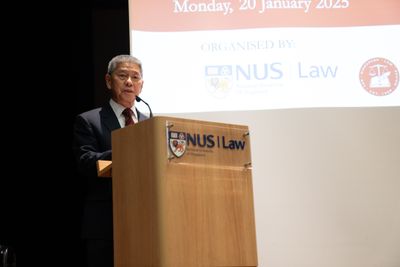
It was a change for a start — a Moot occurring in the morning! If you think waking up and trying to mug at 0800 hrs on a sunny, dreamy Saturday morning is bad enough — think of our valiant friends who had to moot in front of a distinguished bench so early on in the day. The bench comprised of three highly esteemed heavyweights in the legal profession: Mr Harry Elias SC; the Honourable Justice Lai Siu Chiu and Professor Yeo Tiong Min SC, Dean of SMU Law School.
This year’s Harry Elias-SMU moot (now into its 4th year) featured a trio of NUS Year 2 students ,who were up against the sole SMU representative (who so happened to be the incumbent Advo Cup Winner, and previous WongP Moot Champion). A tall order indeed, and the crowd of nearly a hundred-odd were eager to see if the NUS ‘upstarts’ are able to overcome the odds and emerge triumphant over Goliath in their first-ever post-LAWR moot.
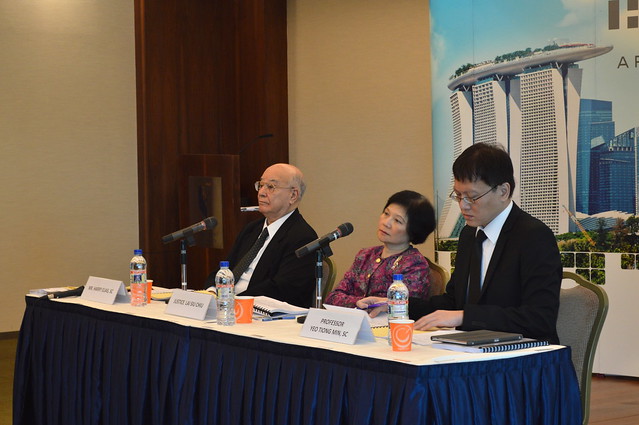
The distinguished panel — L to R: Mr Harry Elias S.C., Lai Siu Chiu J (also Singapore’s first female Supreme Court judge who will retire *tomorrow* after more than 22 years on the Bench), Prof Yeo Tiong Min S.C.
The issue for this moot revolved around Family Law and to a smaller extent, Private International Law. The facts are as follows:
The Wife (the Appellant) is a China National. The Husband (the Deceased) is a Singaporean citizen. On the 1 September 1998, these two parties purported to enter into a marriage in Shanghai, China (“the Shanghai Marriage”). This was despite the fact that the Husband had only attained a decree nisi and not a decree absolute in relation to the marriage to his previous wife. These two parties subsequently solemnized and registered their marriage in Singapore – after the Husband had obtained a decree absolute.
12 years later, upon the breakdown of their marriage, the Husband sought and obtained a divorce from the courts in Shanghai (“the Shanghai Divorce”). This was upheld despite the Wife’s appeal. The Wife subsequently obtained a decree nisi for divorce from the Singapore courts (“the Singapore Divorce”) upon which Ancillary Orders (regarding maintenance and the division of matrimonial assets) were founded.
Unfortunately, before the decree nisi could be made final, the Husband passed away. The Deceased’s estate (the Respondents) brought an action seeking the rescission of the decree nisi and the Ancillary Orders.
There were 2 issues on appeal:
(1) Whether the Shanghai Marriage was void for lack of capacity as the Husband had yet to obtain a decree absolute
(2) Whether the Shanghai Divorce should be recognized
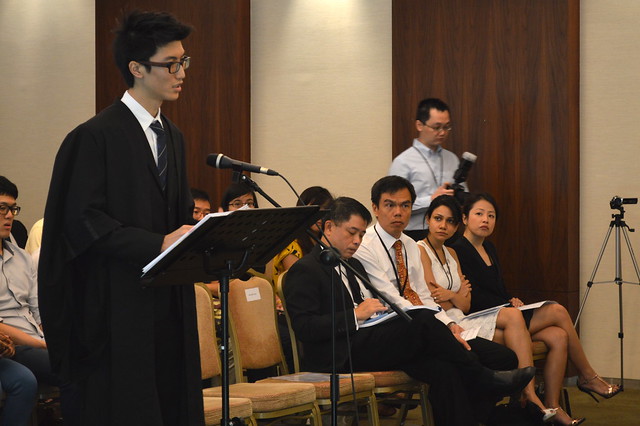
Peide enthralling the judges with his submissions.
Our own Huang Peide, representing the appellant, was up first against decorated mooting champion, Nicholas Liu Sheng from SMU. He attempted to convince the Court to rescind the High Court judgement based on four points — (1) The Shanghai marriage was void, (2) The Shanghai divorce, even if recognised in Singapore doesn’t dissolve the marriage here, (3) The decision of the court in Shanghai should not be recognised by our courts due to public policy considerations and (4) The judgement should stand as it serves to allow ancillary orders to be served in Singapore.
Peide soon found himself bogged down by a barrage of questions from the unrelenting judges, especially from Prof Yeo and Mr Elias — which was to be a recurring theme for the rest of the morning. He was grilled on the intricacies of the “dual domicile” and “intended matrimonial home” tests — which served as a quick introduction to both areas of Family and PIL for the uninitiated in the audience. Peide answered each question posed to him by the bench without any sign of nervousness whatsoever — and unbeknownst to us all, Peide’s allocated time was soon up.
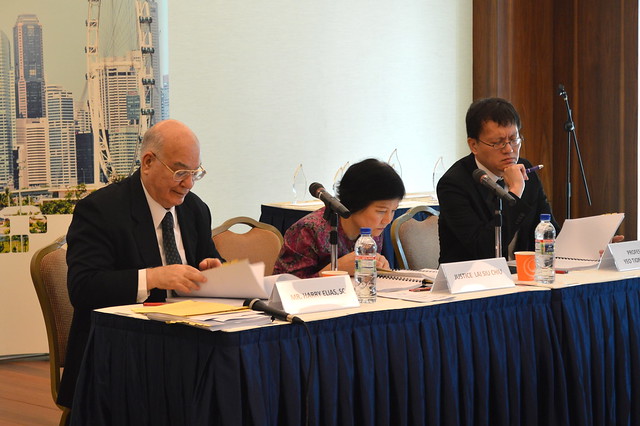
The judges, especially Prof Yeo, were in scintillating form that morning.
Nicholas, the respondent, was next. He readily agreed with the bench’s observations and sought to convince the court to dismiss the appeal by asking “how easily should litigants be allowed to bring an action in Singapore on the back of a valid foreign judgment?” Nicholas was cool, calm and collected throughout the proceedings and even satisfied the most inquisitive of judges with his well-thought through replies.
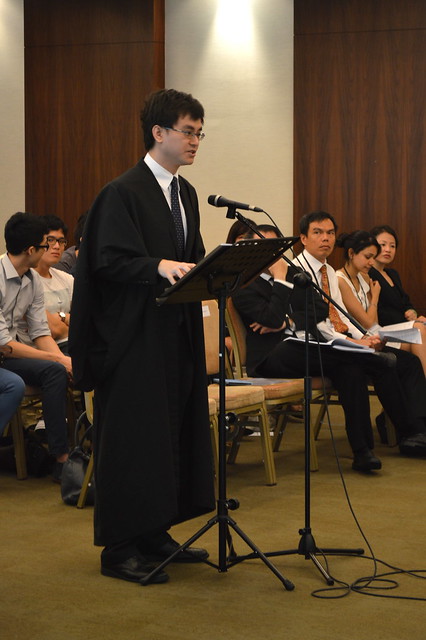
Nicholas with yet another impressive and eloquent performance in the finals of a moot competition.
During rebuttal, Peide concluded his case with a memorable analogy: “this case is not about the wife wanting to have a second bite at the cherry… it is questionable whether she had the first bite… and also whether she had a bite at the cherry at all in the first place”. Likewise, Nicholas entertained us all in his surrebuttal by putting forth the proposition that “not many people will end up marrying in the interim period between the decree nisi and the decree absolute” — to which the bench unanimously exclaimed “are you sure!” with Mr Elias adding on, “maybe he’s still too young…”
***
After a ten minute interval, the judges were raring to go again. David Isidore Tan, of S2N and Squash IFG fame, was up against Shannon Chua.
David’s arguments were (1) The Shanghai Marriage was void for capacity for lack of decree absolute; (2) Alternatively, the Shanghai divorce shouldn’t be recognised for (i) Lack of sufficient connection between the parties and the Shanghai court and (ii) it contravenes public policy as this will enable husband to evade his obligations under the Women’s Charter.
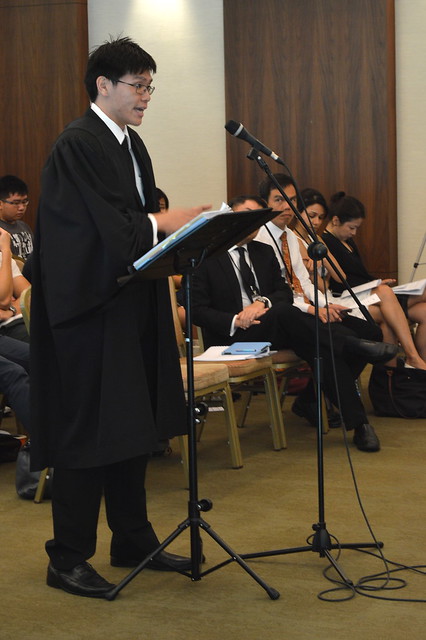
Prof Yeo: “Are you sure?” David: Yes; “Are you sure?” “Yes!”; “Are you really sure?” “YES!”
What followed was an intensive 40-minute Q&A session with the judges, especially Prof Yeo who posed many piercing and detailed questions. It was akin to witnessing two boxers sparring in the ring — it was brutal and aggressive at times with both David and Prof Yeo defending their stances steadfastly. However, there were light-hearted moments interspersed throughout as well.
Memorable jibes included:
“Isn’t it Singapore’s policy to encourage us to marry as fast as we can?” — Prof Yeo, referencing David’s first argument.
“Foreign judgements should not be recognised by Singapore courts in order to protect Singapore for Singaporeans?” — Mr Elias.
When David was quizzed on why the wife did not seek the division of matrimonial assets back in Shanghai, he replied, without a pinch of sarcasm, that it was “most regrettable” that he was not the lawyer back then (in the Shanghai trial)! Therefore he did not know why it was not pleaded in that case.
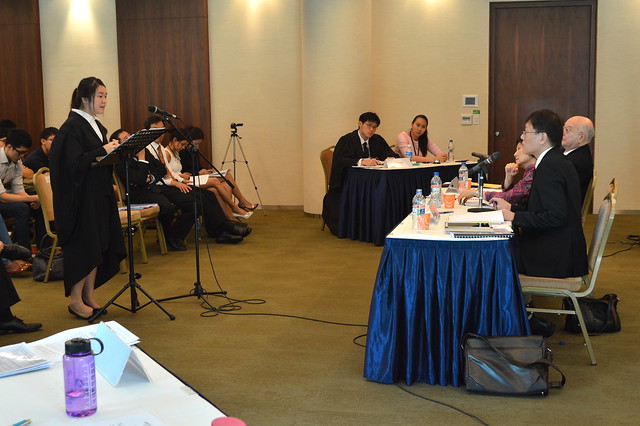
Shannon in the midst of her submissions with David Isadorable looking on.
Shannon was then given the task of responding to the appellant as counsel for the Husband’s estate. She laid down her roadmap quickly, which comprised of the following submissions — (1) The court should find that the only valid subsisting marriage was the one in Shanghai as both of them had the capacity to marry there and (2) Should the first argument fail, the couple still had a marriage in Singapore which the court should nullify according to the Shanghai judgement.
Shannon’s case theory was founded upon the bold proposition that a decree nisi is sufficient in dissolving a marriage for all practical purposes and that a decree absolute was just a mere formality. The judges were piqued by her novel submission, and Mr Elias started off by asking “why should the marriage be ended when the decree nisi acts like an “oh no” provision for third parties to object before the decree absolute?”
The proceedings got even more interesting when Shannon started reciting verbatim the marriage laws of the People’s Republic of China to support her submissions.
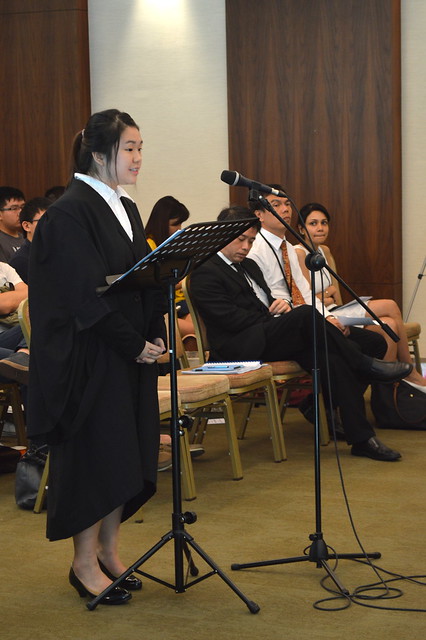
According to article 2 of the marriage law of the People’s Republic of China…
Justice Lai Siu Chiu (who was relatively quiet throughout — relatively, because her two fellow judges were in a stirring mood) delivered the closing:
“I’m sure my fellow judges will agree that it has been a stimulating morning… The CA probably doesn’t shoot as many questions as my fellow judges. I did not ask that many questions because I don’t want the poor counsels to be rattled more than they already are”
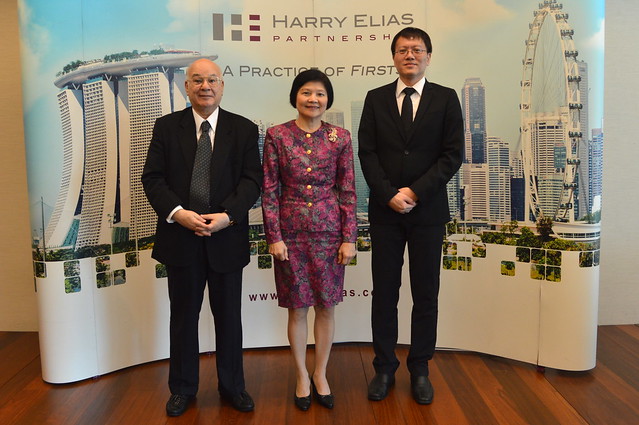
The judges beaming after a hard day’s work.
The results of this year’s HEP-SMU Moot was then announced, with Nicholas sweeping the awards for Best Speaker, Best Written Submission and declared the overall Winner. David was the first runner-up, with Shannon and Peide the second runner-ups.
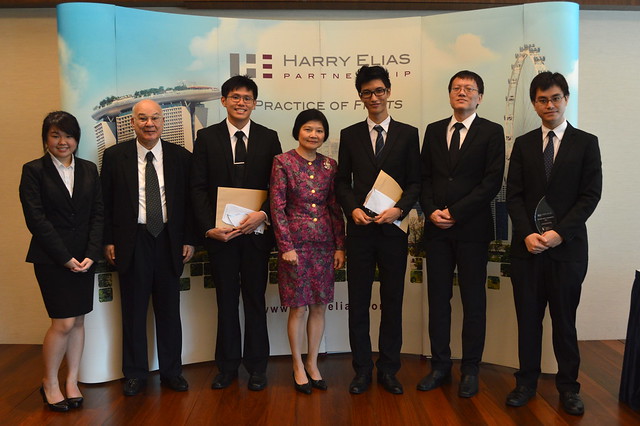
Group photo with the judges: Don’t worry if you did not win the top prize(s), for in our heart you are all winners.
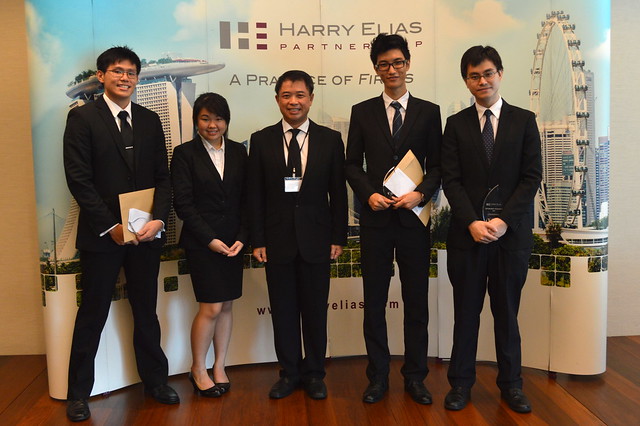
The finalists with Mr Philip Fong, Managing Partner, Harry Elias Partnership LLP who coordinated and organised the moot: “Finalists, can you please stay behind for a photo… with me?”
Special thanks to David for providing Justified with a summary of the fact pattern (in lieu of an official interview)
Article contributed by:




